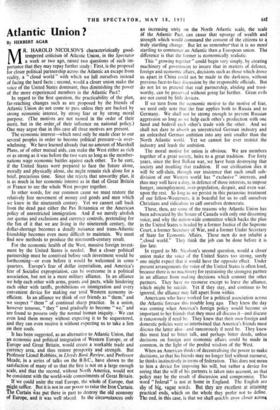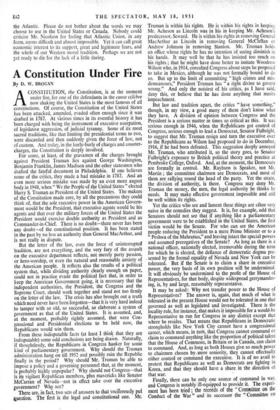Atlantic Union ?
By HERBERT AGAR
R. HAROLD NICOLSON'S characteristically good- tempered criticism of Atlantic Union, in the Spectator a week or two ago, raised two questions of such im- portance that they may repay further study: First, is the proposal for closer political partnership across the Atlantic an escape from reality, a ' cloud world " with which we lull ourselves instead of facing the hard facts ; second, would a closer union make the voice of the United States dominant, thus diminishing the power of the more experienced members in the Atlantic Pact? In regard to the first question. the practicability of the plan, far-reaching changes such as are proposed by the friends of Atlantic Union do not come to pass unless they are backed by strong economic interest, by strong fear or by strong moral purpose. (The motives are not named in the order of their merit, but in the order of their influence on national policy.) One may argue that in this case all three motives are present. The economic interest—which need only be made clear to our several peoples in order to become political pressure—is over- whelming. We have learned already that no amount of Marshall Plans, or of other mutual aids, can make the West either as rich or as strong as it was before the two wars so long as the member- nations wage economic battles against each other. To be sure, if the United States were prepared to face the future alone, morally and physically alone, she might remain rich alone for a brief, precarious time. Since she rejects that unworthy plan, it is as much in her economic interest as in that of Great Britain or France to see the whole West prosper together.
In -other words, for our common cause we must restore the relatively free movement of money and goods and men which we knew in the nineteenth century. Yet we cannot call back froni the dead past either the Pax Britannica or the American policy of unrestricted immigration. And if we merely abolish our quotas and exclusions and currency controls, pretending for the fun of it that we are living in the nineteenth century, the dollar-shortage becomes a deadly nuisance and trans-Atlantic friendship becomes even more difficult to maintain. We must find new methods to produce the nineteenth-century result.
For the economic health of the West, massive foreign invest- ment by the United States is needed. But a closer political partnership must be contrived before such investment would be forthcoming—or even before it would be welcomed in some quarters. Europe's fear of dollar imperialism, and America's fear of Socialist expropriation, can be overcome in a political association, but not in a mere military alliance. In an alliance we help each other with arms, grants and pacts, while hindering each other with tariffs, prohibitions on immigration and every convenient device for making our total Western economy in- efficient. In an alliance we think of our friends as " them,' and we suspect " them " of continual sharp practice. In a union. however tenuous, " they " tend gradually to become " we," and are found to possess only the normal human iniquity. - We can even lend them money without expecting it to be sequestered, and they can even receive it without expecting us to take a lien on their souls.
It has been suggested, as an alternative to Atlantic Union, that an economic and political integration of Western Europe. or of Europe and Great Britain, would create a workable trade and currency area, and thus restore prosperity and strength. But Professor Lionel Robbins, in Lloyds Bank Review, and Professor Meade, in a series of talks on the B.B.C., have shown to the satisfaction of many of us that the first is not on a large enough scale, and that the second, without North America, would not be consistent with the world-wide commitments of Great Britain.
If we could unite the real Europe. the whole of Europe, that might suffice. But it is not in our power to raise the Iron Curtain. The Curtain was put there in part to destroy the old economy of Europe, and it was well placed. In the circumstances only an increasing unity on the North Atlantic scale, the scald of the Atlantic Pact. can cause that upsurge of wealth and strength which would command the consent of the citizens to a truly startling change. But let us remember that it is no mord startling to commence an Atlantic than a European union. Thd difference is that the former is economically realistic.
This " growing together " could begin very simply, by creating machinery of government to insure that in matters of defence, foreign and economic affairs, decisions such as those which drove us apart in China could not be made in the darkness, without previous face-to-face discussion by the responsible officials. But do not let us pretend that real partnership, abiding and trust- worthy, can be preserved without going far further. Great evils are not cured by little devices.
If we turn from the economic motive to the motive of fear, we need only note that the fear applies both to Russia and to Germany. We shall not be strong enough to prevent Russian aggression so long as we help each other's production with one hand and bedevil each other's trade with the other. And we shall not dare to absorb an unrestricted German industry and an unleashed German ambition into any unit smaller than the North Atlantic world. Yet we cannot for ever restrict the industry and leash the ambition.
The moral motive for union is obvious. We are members together of a great society, heirs to a great tradition. For forty years, since the first Balkan war, we have been destroying that society and insulting that tradition. If our civilisation dies it will be self-slain, through our insistence that each small sub-' division of our Western world has " exclusive " interests, and thus may well have a duty, in defence of those interests, to impose hunger, unemployment, over-population, despair, and even war. upon the rest. So long as we persist in this paranoiac treatment of our fellow-Westerners, it is boastful for us to call ourselves Christians and ridiculous to call ourselves democrats.
These, then, are some of the reasons why Atlantic Union has. been advocated by the Senate of Canada with only one dissenting voice, and why the nation-wide committee which backs the plan in the United States is headed by a former Justice of the Supreme Court, a former Secretary of War, and a former Under Secretary of State for Economic Affairs. These men do not inhabit a "..cloud world." They think the job can be done before it is too late. In regard to Mr. Nicolson's second question, would a closei union make the voice of the United States too strong, surely one might expect that it would have the opposite effect. Under present arrangements the voice of the United States is often loud, because there is no machinery for restraining the strongest partner in an alliance from making decisions which commit the other partners. They have no recourse except to leave the alliance, which might be suicide. Yet if they stay, and continue to be ignored, the alliance may fall apart from within. Americans who have worked for a political association across the Atlantic foresaw this trouble long ago. They knew the day was coming when America's foreign policy would become so important to her friends that they must all discuss it—and discuss it rancorously if need be. They knew that their own foreign and domestic policies were so intertwined that America's friends must discuss the latter also—and rancorously if need be. They knew this must lead to bitter talk, and perhaps bitter deeds, unless decisions on foreign and economic affairs could be made in common, in the light of the pooled wisdom of the West.
When an American thinks of decentralising the power to make decisions, so that his friends may no longer feel without recourse, he thinks instinctively in terms of federation. This does not mean to him a device for imposing his will, but rather a device for seeing that the will of his partners is taken into account, so that policy may be the result of discussion and compromise. The word " federal " is not at home in England. The English are shy of big, vague words. But they are excellent at attaining practical ends, which on the whole they prefer not to define. The end, in this case, is that we shall quickly grow closer acrosa the Atlantic. Please do not bother about the words we may choose to use in the United States or Canada. Nobody could criticise Mr. Nicolson for feeling that Atlantic Union, in any form, seems difficult and almost impossible. Yet it can call great economic interest to its support, great and legitimate fears, and the whole of our Western moral tradition. Perhaps we are not yet ready to die for the lack of a little daring.







































 Previous page
Previous page